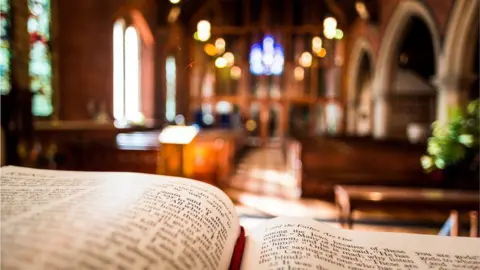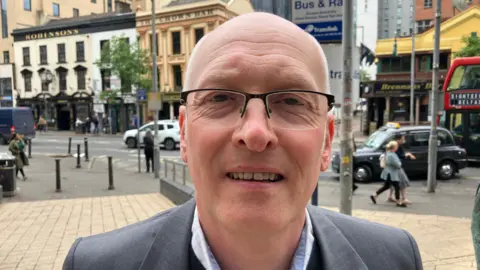Methodist Church apologises for 'all forms of homophobia'
 Getty Images
Getty ImagesThe Methodist Church in Ireland has apologised "unreservedly for failures in pastoral support and care" to the LGBT community and their families.
The church also said it strongly condemned all forms of homophobia both within the church and the wider community.
However, the church has decided that marriage remain a relationship "between one man and one woman".
It has decided not to follow the Methodist Church in Great Britain in allowing same-sex marriages.
The Methodist Church in Ireland (MCI) is one of the main religious denominations and is made up of about 200 churches in both Northern Ireland and the Republic of Ireland.
The United Methodist Church in the US recently voted to allow LGBT clergy to serve in the church, reversing a 40-year ban.
It is unclear whether individual Methodist churches in Northern Ireland or the Republic will have the power to allow people in same-sex relationships to continue in leadership roles.
That followed an amendment voted on by members of the MCI at their conference in Belfast.
'Worth or dignity'

Steven Smyrl, who is in a same-sex marriage and currently sits on the church council of the Methodist Church in Sandymount in Dublin, welcomed the apology.
"It was very welcome, but how far does it go?" he said.
"It still leaves a lot of same-sex people wondering are their relationships given any worth or dignity."
Mr Smyrl had previously been dismissed as an elder by the Presbyterian church due to his relationship.
He hoped the MCI's ban on same-sex marriage would change.
"The chances are if the Methodist Church in Ireland survives - like the other evangelical churches in Northern Ireland - I think in the Methodist Church there will be an acceptance of open gay relationships including same-sex marriage."
Mr Smyrl said there were a large number of gay people in the Methodist Church.
"Many of them are just quiet, they keep their head down, they don't ever let on their situation about their home life, and that's a really sad way to exist," he said.
'Anything goes'
Sexuality was debated by members of the Methodist Church in Ireland during their 2024 conference in Belfast.
A decade-long review into "human sexuality" by the church was presented to delegates as a report.
It reviewed Christian teaching on human sexuality, and recommended standards for membership and leadership of the MCI.
The report into human sexuality also explored "the disciplines required in regard to sexual behaviour" by leaders in the church, including clergy or members of church councils - the governing bodies of individual Methodist churches.
The report heard concerns "about inconsistency of approach - for example, where entering into a same-sex dating relationship was seen as grounds for being asked to step aside from a role, while being in a sexually active, unmarried, opposite-sex relationship was not".
As a result the report recommended individual churches and their councils could decide if people in same-sex relationships could serve in leadership roles.
Delegates were told in a document, however, that did not mean "anything goes".
And an amendment passed by members left it unclear if those in same-sex relationships could be in leadership roles within the church.
How did Methodist members react?
During a passionate debate, some speakers were critical of the review's recommendations on sexuality and said they could not support it.
"Boundaries that God instituted in creation for human flourishing are no longer part of what it means to be an Irish Methodist," one said.
Others said they felt "conflicted" and were concerned about "a split in the church"
"Churches who have adopted this approach are in decline," one said.
But others supported the review, with one Methodist who backed it saying it "expresses the inclusiveness of the gospel".
"I am queer and I want to work with children and young people through the church," another delegate said.
"It is what I believe God has put me here to do and why should one part of my identity bar me from doing that?"
Members of the church backed the report on human sexuality by 148 votes to 64.
